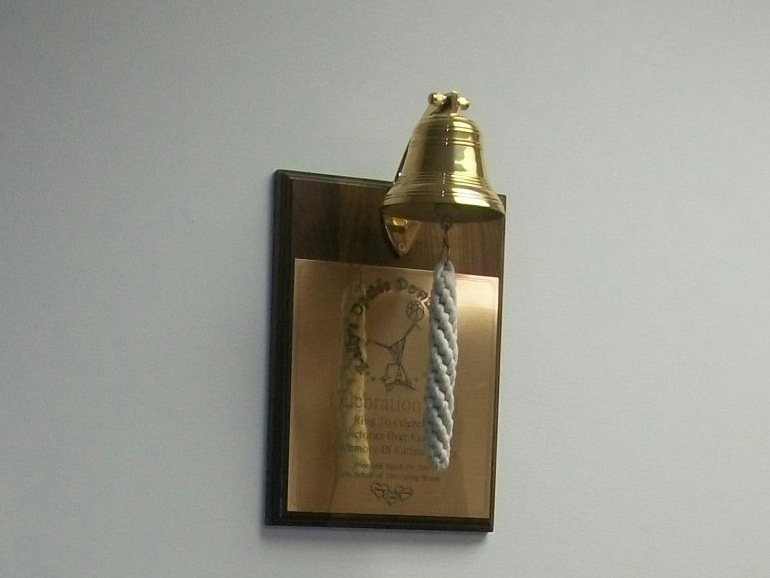For children facing the long, grueling and often painful process of battling cancer at Children's Hospital of Wisconsin, there is a glimmer of light at the end of the tunnel, a special reward of sorts.
A bell hanging on the wall of the MACC Fund Center at Children's remains silent until a patient finishes his or her treatment. Then and only then, that bell rings loudly.
When patients finish their treatment, they get to ring the bell to signify their move into the survivorship phase. The bell-ringing is a very special event, says Julie Martindale, director of the MACC Fund Center, one which attracts a lot of attention from families, patients, physicians and staff.
She got the idea while working at the children's cancer clinic in Indianapolis. The Upside Down Foundation, which is dedicated to enhancing the lives of individuals with Down syndrome, awards bells to various medical centers that support Upside Down's efforts.
Her hospital there was awarded a bell, which patients used to mark the end of their treatments.
"I moved back to Milwaukee and when we were awarded a bell about a year ago, I knew a little about it," Martindale says.
Martindale wanted the bell-ringing to become a special event for the patients and their families. She composed a poem which is read aloud by the patient before ringing the bell and the event has drawn quite a crowd with nurses, doctors, hospital staff and other patients and their families taking part.
And while it's become quite a celebration, it's a particularly emotional and moving event for those involved – especially members of the nursing staff, who have a great deal of day-to-day interaction with the children, their families and friends.
"It's a wonderful celebration," says Renee Harteau, a nurse at the MACC Fund Center. "We go through the ups and downs with the family and feel proud for patient and the family for making it through this long, hard treatment. It's very exciting for us to watch them have that moment."
Harteau has seen many bell-ringing ceremonies since the practice started about a year ago. As the bell has become more well-known, she's seen more and more people turn out when somebody gets the opportunity to ring the bell.
For many families facing cancer, the sight gives them an added glimmer of hope and strength.
"People have started to realize what it means," Harteau says. "For patients currently going through the treatment, they kind of feel like it's seeing a light at the end of the tunnel. It provides hope to them and their families that they can get through this."
Dean and Susan Wernicke's son, Andrew, underwent surgery a year ago to remove a tumor from the stem of his brain. Not long after the surgery, he and his family learned of the bell-ringing ceremony.
"I looked on the wall and read the plaque," Susan says. "The nurse told Andrew than when he's done with his treatment, he could ring the bell on his last day."
He finally got to ring it in February. With a pretty big crowd gathered around, he was just a little bit timid when it came time to ring the bell but once he did, he raised his fists in the air in celebration, a smile splashed across his face.
"That was the tell tale sign of him saying 'I beat this," his father says.
The family went all out for Andrew's moment. They ordered a cake, complete with a picture of the bell on it, and his sister, Paige, created a video chronicling the event, which she posted to YouTube (see below) later that day.
"It was such a great say," Susan says. "There were quite a few people there, I don't think he was expecting that."
Andrew did return to the hospital a few days later with a bout of pneumonia. Today, though, almost a year to the day after his surgery, he's returning to his old routine. Andrew is back playing Little League and, his father says, he is throwing right around 50 miles per hour.
He still needs to undergo regular check-ups and gets an MRI done every three months but he's become a source of strength and inspiration for his parents.
"He's helped us so much," Susan says. "We were having a rough time right around Valentine's Day, right after he was treated for pneumonia. My husband came up from the basement and it was pretty obvious he had been crying.
"Andrew looked at him and asked 'were you crying again?' When he said yes, Andrew looked at him and said 'Dad, you need to go downstairs and pull yourself together. I'm going to be fine'."
Everybody involved knows that just because the treatment phase has ended, the risk isn't completely gone. Still, they feel that celebrating the end of that treatment is an important step in the process, and one that should be recognized.
"It's just like celebrating a birthday," Harteau says. "You have to celebrate those happy times even though you don't know what's around the corner. You can't live in that moment, you have to live in the moment you have here, right now."




